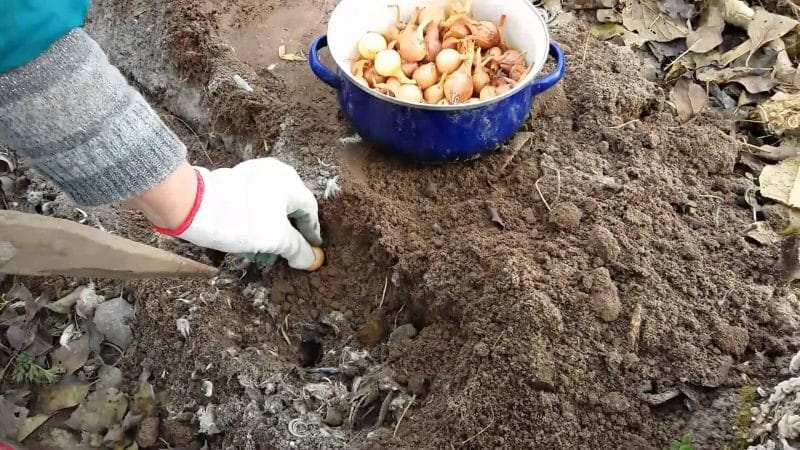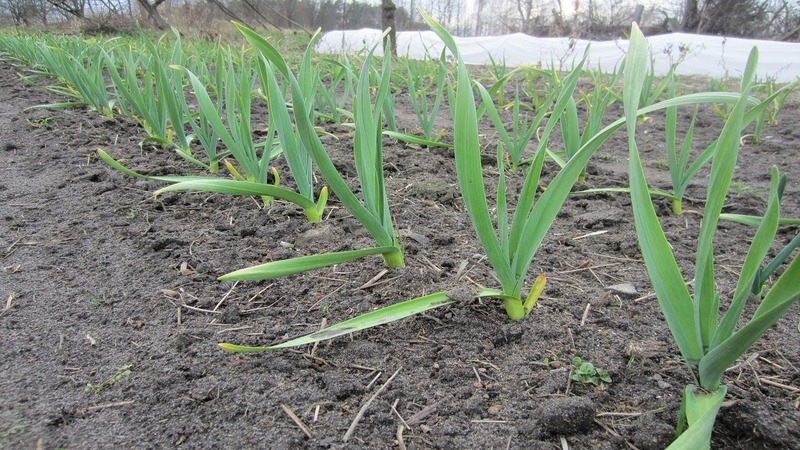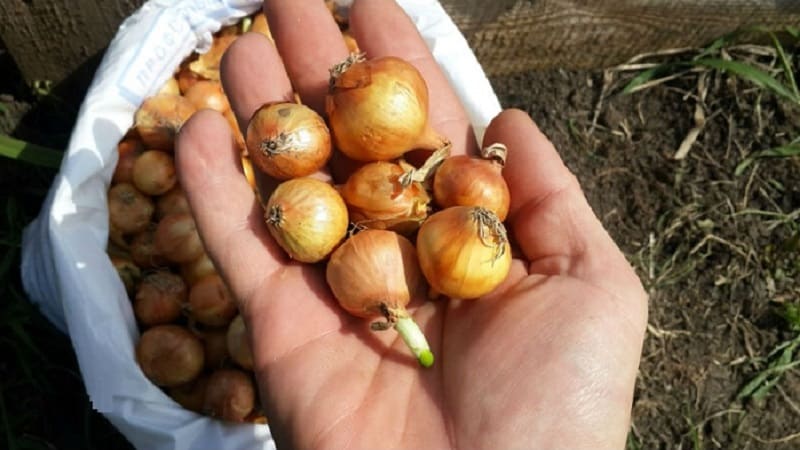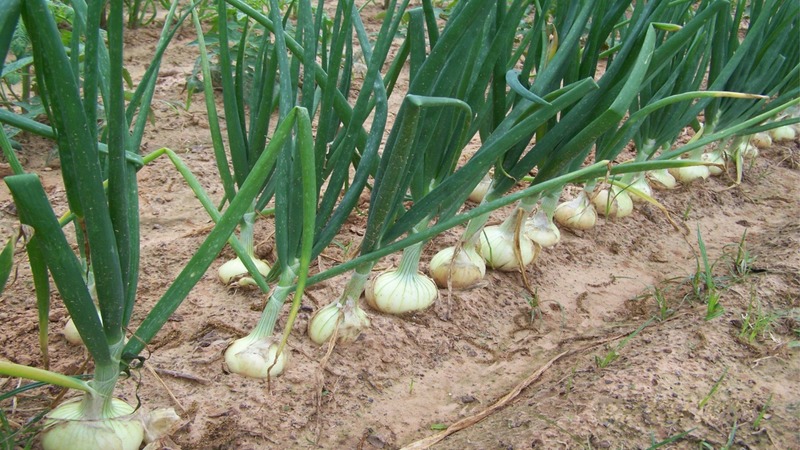What to do and what to do if winter onions sprout in the fall
Onions are a healthy product containing a large amount of vitamins and substances that inhibit the spread of infection in the body. Even more useful is a vegetable grown with your own hands without the use of harmful chemicals, which is why almost every garden has this crop. But many gardeners ask questions: when is it better to plant a vegetable in order to get a good harvest, and what to do if the onion, planted before winter, has sprouted? Let's talk about this.
Is it possible to plant sprouted onions before winter?

It all depends on how sprouted the onion is. Possible options:
- If the bulb has sprouted a little, it can be plant before winter with everyone else. Just before doing this, you need to check the weather forecast to see if frost is expected the next day. Otherwise, the sprouts may die.
- If the sprouts are medium in size, they should be cut off and then planted with onions. But such an onion will not produce a turnip.
- If the bulb has sprouted too much, all that remains is to throw it away, because there will be no harvest from it.
It is recommended to plant seedlings with cut sprouts in a separate part of the garden bed. This way, after sprouting, it will be easier to understand where the onions are located on the greens (for quick consumption).
Reference. In order not to throw away the sprouted seedlings, you can plant them in a jar at home. Then there will always be fresh greens on the table.
Advantages and disadvantages of planting onions in the fall
To decide whether to plant onions before winter, you need to weigh the pros and cons.
Planting onions in the fall is a good idea because:
- The harvest will appear early. The bulbs will be larger, and it doesn’t matter which one variety planted
- After harvesting, space will be freed up for planting something new. For small plots of land this is a suitable solution.
- Onions planted in the fall do not need to be weeded often - weeds do not grow well in cold weather.
- The plant suffers much less from onion flies.
- The winter harvest is stored well and for a long time.
Disadvantages of planting onions before winter:
- You need to plant more, because not all the bulbs will survive the winter.
- Unpredictability of weather. If there is little snow and severe frosts in winter, all planted onions will freeze. The beds will have to be insulated.
Lack of ventilation, high humidity and the presence of mulching material, which provides a greenhouse effect in warm weather, can lead to the formation of rot. It can be identified visually: it appears as a whitish powdery coating, the bulb becomes slippery and soft.
Planting spoiled seedlings is fraught with loss of the entire harvest, since the fungus quickly spreads through moist soil and spreads to healthy bulbs.

Important! To prevent the seedlings from dying, sprinkle 1-3 cm of sawdust on top of the bed. In the spring they will disperse in the soil and create a loosening effect. In this case, the beds can be watered 2 times less often.
When to plant onions for the winter
It is recommended to plant for the winter from the end of August to the end of October. This is a long period of time. Much depends on the region of residence. Planting is carried out 3-4 weeks before the appearance of persistent frosts.
If the air temperature does not rise above +5°C for 3-5 days, then it is time to plant winter onions. Even a few days of warm weather can trigger growth, so you need to focus on the average daily air temperature.
Landing technology
The method of planting onions for the winter is not particularly difficult. You need to decide on the location of the beds, prepare the soil and seeds.
Site selection and soil preparation
For cultivation, choose a place that is well ventilated and illuminated by the sun. The site should be open so that as much snow as possible falls on it.
The soil should be loose. You won’t be able to grow a lot of onions on clay soil.
Soil preparation includes:
- weed removal;
- digging up the beds;
- checking soil pH (should be around 6.0-6.2);
- tillage of soil with ash.
Preparing, sorting and processing bulbs before planting

Initially, the bulbs are sortedin order to remove the sick and not accidentally add them to the healthy ones. Then they are distributed by size. Large sets are not suitable; choose a size up to 15 mm.
Important! 14 days before planting, the seedlings are soaked in warm, almost hot water (about 47°C), kept for 3-4 hours and removed from the water. If left for several days, the seedlings will become unsuitable for use. landing.
After warming up, they move on to treating potential pests. The drug “Fitosporin M” and its analogues are used. Soaking for an hour in a solution of potassium permanganate helps a lot.
Planting scheme
Onions should not be planted too deep for the winter. Dig beds 6-7 cm deep. First, fill them with sand - this way you can save the crop from waterlogging. Planted to a depth of 3-4 cm.
The bulb is placed vertically, pressed with your hand and covered with earth on top. The distance between the bulbs should be at least 7 cm. Planting them in one bed further than 10 cm from each other is also not worth it - space should be used sparingly. The distance between the beds is left at least 15 cm.
What to do if winter onions sprout in the fall
After planting in autumn, onions should not germinate until spring. If this happens, you need to understand the reasons and take measures to save the harvest.

Why did it happen
The main mistakes gardeners make that lead to the germination of winter onions:
- Boarding too early. Despite the fact that many sources recommend starting planting at the end of August - September, the peculiarities of the local climate must be taken into account. If planted in warm weather in September, you may experience premature germination.
- The size of the planted bulbs is too large. A set of 2-3 cm in size will germinate faster than a small one, so it cannot be planted for the winter.
- The wrong place for planting is damp or too warm, where there is not enough ventilation.
There are also reasons independent of the human factor - for example, a late start of winter, an abnormally warm autumn.
Will there be any point?
If onions sown before winter begin to germinate ahead of time, they can only be of use in one case - if the winter is mild and warm.
If it does survive, the harvest will be half that planned, because it will be much more difficult for such onions to germinate further.
At what temperature do onions germinate before winter?
Before winter, onions begin to germinate at above-zero temperatures. If the thermometer has risen above 12-15°C, you should be wary of early shoots.
What to do in such a situation
In the current situation, the most important thing is to prevent the sprouted onions from freezing.. This will require simple insulation methods. For example, dig up loose soil from the greenhouse that has not yet frozen and fill the bed with a layer of 2-3 cm.
In such a situation, mulching material is suitable: grass or weed clippings, compost, fallen leaves, hay, nettles, bark or wood chips. Mulch is poured on top of the ground. Then the bulbs will be protected from freezing.
If onions are planted in late August or early September, and there is still time for warm weather, it is worth digging up what has sprouted and sowing the beds with new sets. However, if the ground has frozen and become hard, nothing can be planted in such soil until spring, because the bulbs will not take root.
Features of care
Caring for winter onions is as follows:
- In early spring, the soil is low in nutrients, especially nitrogen. For feeding, it is better to use complex compounds containing nitrogen. Treat at the rate of 30 g per 1 m2 of bed area. Fertilizers are dissolved in warm water.
- In the spring-summer period, feed at least 1-2 times a month. To do this, take 2-3 kg of herbs and infuse them in 10 liters of water for 2-3 days. Strain the infusion, add water and pour over the onions.
Winter onions do not require specific care. It is resistant to pests. Intensive watering, necessary at the beginning of growth, replaces melt water.
Important! In spring, it is necessary to regularly weed the beds and loosen the soil.
How to protect a garden bed from frost
To prevent the garden bed from freezing in winter, use mulching material. Peat, hay, spruce branches, and fallen leaves are well suited for winter onions. The bed is filled with any of the materials 10-14 days after planting. The colder the region, the thicker the mulch layer.
The mulching material is reinforced with branches on top. You cannot cover the beds with film - this will create too high a temperature and excessive humidity. With the beginning of spring, the insulating material is removed.
Tips and tricks
You can get a large and high-quality harvest by following these recommendations:
- Treat the soil to remove weeds and saturate it with nitrogen-containing fertilizers.
- 2-3 weeks before planting, add ash to the ground - 0.5 kg per 1 m2.
- Go through the seedlings, checking for damage and signs of rot.
- On the day of planting, first soak the seed for 30 minutes in salt water, then rinse and immerse in a saturated solution of dark pink potassium permanganate for 10-15 minutes.
- After winter, make sure the soil is always moist.
- When 70% of the onions have sprouted, start loosening the soil at least once a week.
Conclusion
Planting onions in the fall is profitable and convenient, since at this time of year the load in the garden decreases. If suddenly winter onions sprouted ahead of time, do not despair - this is a solvable problem. A seed planted and prepared in the right place is the key to success in obtaining a good harvest.